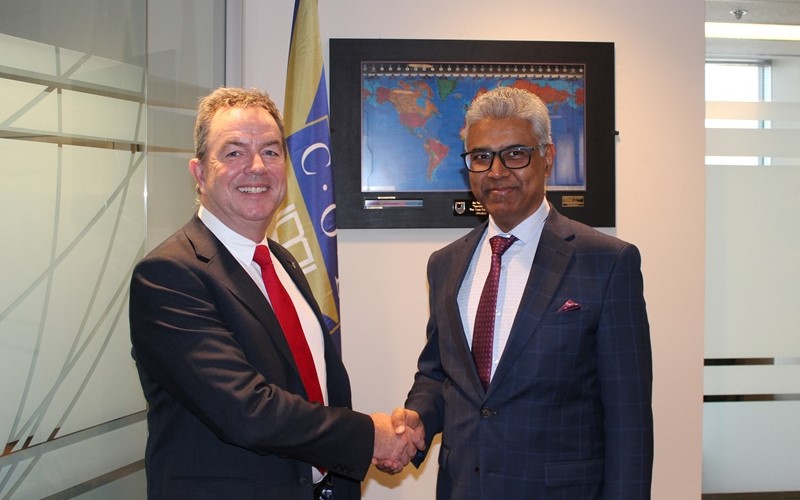
Under the theme of ‘Reflections on COL in India’, the Commonwealth of Learning’s (COL) President and CEO, Professor Peter Scott, and senior COL staff welcomed the Consul General of India in Vancouver, Mr Manish, to COL’s Headquarters in Canada.
In one of his first official duties since becoming President in early January 2024, Professor Scott hosted a meeting to discuss COL’s unique bilateral relationship with India, especially regarding the role that the Commonwealth Educational Media Centre for Asia (CEMCA), COL’s centre in India, is playing in driving development with the power of learning.
The President, Vice-President and other senior COL colleagues illustrated to the Consul General that in India, besides assisting universities and schools and helping to build faculty capacities, COL has also helped a wide range of institutions to mainstream open, digital and distance learning – including rural development banks as well as community-based organisations. Further to this, COL works to bring the voice of India in learning to the wider Commonwealth through our joint work.
Dr B Shadrach, Director CEMCA, speaking from New Delhi, noted the power of India’s National Education Policy (2020) and its influence in the delivery of education and skill development in India and beyond. The Policy is also driving teacher training work in physical education in India so also for accommodating persons with disabilities. He also noted that India’s Policy has been taken by COL as an exemplar beyond India as a framework for change, particularly in the Commonwealth Asia countries.
Dr Balaji, COL’s Vice President, also talking virtually from India, emphasised the wide range of innovations that have been jointly created with Indian innovators to deliver, including ideas such as blockchain for certification, COL’s MobiMooc platform, and even deploying GPT-bots for improved learner support.
Dr Jyotsna Jha, COL’s Director, Skills, discussed TVET and training initiatives that have progressed in India over the last few years. She drew the Consul General’s attention to the skills online scholarships COL offers in partnership with Coursera, Google and Udemy on 21st-century skills. These scholarships have saved Indian learners many millions in USD dollars for these upskilling and training courses.
Dr Tony Mays, Director: Education at COL, noted to the Consul General that COL’s partnership with India over the last 36 years has helped ensure that India’s Open Education system was now arguably the most powerful globally. COL has been working with the National Institute of Open Schooling (NIOS), India to increase the impact of open schooling in the country (NIOS is the world’s most extensive Open School system) and drive change outside India. For instance, a 2023 joint COL/NIOS initiative called Gender Green Teacher (GGT) supports teacher training for open schooling and has already been adapted for Mozambique.
Dr Balaji added that in post-secondary learning, there could be no argument about the power of the ‘Indian Open’ since 18 of the world’s 44 open universities are based in India, and approximately 11 per cent of all Indian post-secondary students are open learners in that system. This considerable achievement is an astonishing success story in which COL continues to play a critical role. Dr Shadrach drew attention to the Ahmedabad Declaration – a consortium agreement signed by 17 Indian OU’s to demonstrate their alignment and commitment to working together strategically.
In discussion, a number of critical topics for the next phase of the COL-India partnership were considered, for instance, to increase the impact of Open Education not just to improve access for disadvantaged learners but also to help all post-pandemic mainstream universities and schools, now aligning on the need to drive up their reach and quality in online and hybrid modes. And, of course, the Consul General pointed to India’s excellent innovators, both inside the country and in the extensive diaspora, who are already driving worldwide economic impact in technology and education. It is to these great innovators that COL can look for the next generation of change-makers.
In closing, Professor Scott commented on the strong and enduring partnership that has been cultivated between COL and India since COL’s formation in 1987:
“India is a powerhouse of the Commonwealth, representing half its 2.5 billion people, and understands the power of learning for its own peoples and the wider good of the world. COL is delighted to have such a strong partner in our work and had the honour of discussing our next steps together with Consul General Mr Manish, today.”
A copy of the presentation by COL to the Consul General of India is available for download here: http://hdl.handle.net/11599/5512


